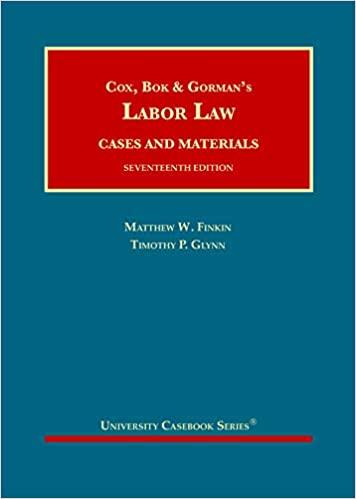Question
1) What are two defense strategies to procure an acquittal at trial? 2) In the American criminal justice system during the criminal trial who sustains
1) What are two defense strategies to procure an acquittal at trial? 2) In the American criminal justice system during the criminal trial who sustains the burden of proof as to each and every element of the crime AND what is this standard of proof for criminal trials? 3) At common law what was the difference between an excuse to criminal conduct and a justification? 4) (INSERT ANSWER HERE) is when the Df believes he was justified in committing the act but in fact he was not. If he can successfully prove this the DF can still have charges mitigated or dropped. 5) What are some categories of affirmative defense. 6) Under the (INSERT NAME OF TEST) the DF will be NGRI if he or she can show that they suffered from a disease of the mind at the time they committed the crime that (circle all that apply) a) made them unable to appreciate the nature and quality of their act b) made them unable to control their actions c) made them take drugs to suppress their criminal thoughts d) made them unable to appreciate the wrongness of their acts. 7) A schizophrenic DF who butchered his wife and then hid the body parts to evade discovery would probably not be able to satisfy the M'Naughten test (TRUE OR FALSE). 8) A person with severe depression who murdered her children and then then turned herself in may be able to meet the M'Naughten test. (TRUE OR FALSE). 9) A Serial killer who eats his victims after he murders them and hides out from police would probably be able to meet the M'Naughten test. (TRUE OR FALSE). 10) Under the Irresistible impulse test for NGRI If the defendant cannot control his or her conduct because of the mental defect or disease, the defendant's conduct is excused even if the defendant understands that the conduct is wrong (TRUE OR FALSE). 11) The substantial capacity test is the insanity defense created by the Model Penal Code. By 1980, approximately half of the states and the federal government adopted the substantial capacity test (also called the Model Penal Code or ALI defense). What famous trial made the federal government and many states abolish this test? I.e. the trial of what DF who was acquitted under the substantial capacity test for NGRI? 12) In general, it is EASIER/HARDER to establish insanity under the substantial capacity test because both the cognitive and volitional requirements are scaled down to more flexible standards. Unlike the M'Naghten insanity defense, the substantial capacity test relaxes the requirement for complete inability
to understand or know the difference between right and wrong. Instead, the defendant must lack substantial, not total, capacity. (CIRCLE ONE) 13) To successfully claim self-defense, the defendant must prove four elements. What are these elements? 14) In general, if the defendant initiates an attack against another, the defendant cannot claim self- defense (State v. Williams, 2010). This rule has two exceptions. What are they? 15) Describe a famous case using either of the affirmative defenses we have discussed (self-defense or NGRI.) What was the outcome? Do you agree with the outcome? Did the public agree with the outcome? (Worth 10 points) 16) Extra credit: Name one criminal law case that we have discussed this semester and something new that you learned from the discussion.
Step by Step Solution
There are 3 Steps involved in it
Step: 1

Get Instant Access to Expert-Tailored Solutions
See step-by-step solutions with expert insights and AI powered tools for academic success
Step: 2

Step: 3

Ace Your Homework with AI
Get the answers you need in no time with our AI-driven, step-by-step assistance
Get Started


